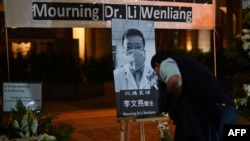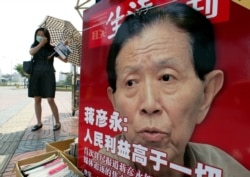While the world mourned the recent death of the young Chinese doctor who was detained by police for exposing the coronavirus, news of another whistle-blowing doctor, who exposed the severe acute respiratory syndrome (SARS) epidemic 17 years ago, being under house arrest in Beijing has shocked the world.
Since April of last year, authorities have restricted the movements of Jiang Yanyong — the 88-year-old Chinese military surgeon who exposed the government’s cover-up of the SARS epidemic in 2003 — and they have cut off his contact with the outside world. The Chinese government took the steps after Jiang wrote to top leadership asking for a reassessment of the 1989 Tiananmen Square pro-democracy movement, according to a close friend who spoke on condition of anonymity.
Dr. Li Wenliang, 34, an ophthalmologist who worked at the Wuhan Central Hospital in central China, died last Friday after he was infected during the battle against the coronavirus outbreak. His death prompted anger and grief across the nation because he was detained by police in early January after telling his medical school alumni group on social media that seven patients diagnosed with an illness similar to SARS had been quarantined in his hospital.
The mysterious virus was what would become the coronavirus epidemic that so far has killed at least 1,110 and infected more than 45,000 people around the world, mostly in China.
The tragic fate of the two whistleblower doctors, 17 years apart, is a sobering reminder that, despite China’s stellar economic progress, Chinese citizens are still bereft of basic rights, analysts say. And when they are punished for exposing truths that officials want to conceal, it can have disastrous consequences not only in China, but on a global scale, they say.
Kenneth Chan, a political scientist at Baptist University of Hong Kong, noted that in China and former communist regimes, where human rights are routinely suppressed as a result of censorship and self-censorship, “People are rewarded to lie and to cover up, but punished for telling the truth.”
“The former communist regimes were all known as crisis-ridden nations and ... the rest of the world suffered from the externalization of the crises in terms of environmental, health, and humanitarian disasters,” he said.
Johnny Lau, a veteran China watcher and former journalist at Beijing-backed Wen Wei Po, a Hong Kong-based Chinese language newspaper, said the fact that authorities took revenge on both whistleblower doctors for speaking the truth over a span of 17 years shows that China continues using “feudal, dynastic-style governance.”
“Autocracies worry that speech freedom would undermine its rule,” he said. “It’s not a matter of 17 years, but 3,000 years. The authoritarian ideology has lived on.”
Since Chinese President Xi Jinping took power in late 2012, he has shown resistance to modern, liberal values, said Lau. An internal Communist party document written in 2013 that's known as Document No. 9 ordered cadres to tackle seven supposedly dangerous influences on society. Those included Western notions of rights and freedoms, such as press freedom, “universal values” of human rights, civil rights and civic participation. The Communist Party has warned cadres they would be punished for voicing opinions that differed from the leadership.
“The consequences of these are showing now,” Lau said.
Doriane Lau (no relation to Johnny Lau), a researcher at Amnesty International, said: “The international community should see that limiting information and taking away citizens’ freedom of speech … carry grave risks for not just one country, but the entire global community.”
Johnny Lau said it would be hard to sustain China’s soft power in the long run and “it could deteriorate even further.”
“Even if it continues to be an economic power, politically, it is a dwarf. It is not going to be a responsible world power,” he said.
Lau said political friction in China will intensify as ordinary people’s call for basic freedoms increase amid the recent health crisis, while the authorities continue to govern with its official, stagnant ideology.
It remains to be seen whether ordinary Chinese people’s heightened rights awareness would amount to a force powerful enough to bring about political change, he said.
Political scientist Chan said Xi’s public response to the coronavirus crisis, such as “declaring war on the virus” and rallying national unity around his leadership, are part of his efforts to promote a cult of personality.
“These are typical communist-style responses to crisis. Is China today stronger than the former Soviet Union?” he asked. “Not really. Crises will strike again.”






